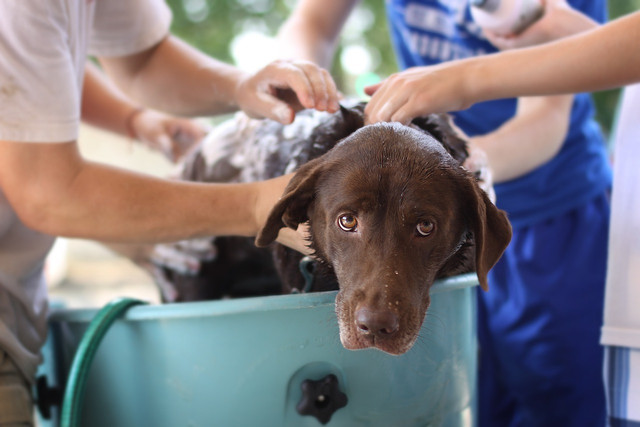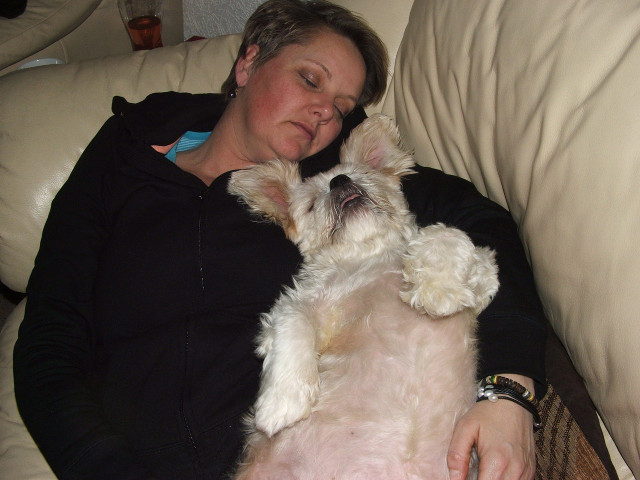Should I let my dog sleep with me? It's a question many owners ask before deciding where they and their furry friends should retire for the night. Find out by reading more.
If you are wondering should I let my dog sleep with me? the answer will depend entirely on you, your health, your dog’s health and your lifestyle. In 2021, $123.6 billion were spent on American pets and 69 million households reported owning a dog. According to the American Kennel Club (AKC), just under half of these dog owners share their beds with their four-legged friends — so sleeping with a dog clearly works well for some.
For many, dogs are their primary source of companionship and hugely important family members. The bond between owners and man’s best friend is often a profoundly strong one. Relationships with pets have actually been reportedly more secure on every measure than relationships with romantic partners in some research. Sharing our beds with them can be the most natural thing in the world for some of us. For others, the idea of sleeping beside an animal is a definite no-no. So, should you let your dog sleep with you? Let’s check out the pros and cons.
Why Should I Let My Dog Sleep With Me?

(Foto: CC0 / Pixabay / Alkhaine)
According to Harvard University, dog owners have lower blood pressure, better cardiovascular heath, lower cholesterol levels, and a lower risk of heart disease, than non-owners — and that’s just the start of it. Owning a dog is also associated with lower bouts of loneliness, anxiety, and depression. Dog-owning benefits have been so overwhelming, that Harvard launched the “Get Healthy, Get a Dog” as a health promotion tool. Sleeping with dogs extends the time spent with them and maybe the benefits they bring too.
Even just engaging with a pet has promising effects on preventing depression in older people and the reported benefits of being with dogs is abundant. The most extensive cross-sectional study carried out to date examined the views of 6,575 dog-owning participants. The research revealed that overall, dog owners feel more positive about their neighborhood, do more exercise, and fall asleep more easily than non-dog owners.
The study did also find that for some participants, pet ownership was also associated with feeling more tired after waking up. It’s important to note though, that this cohort was aged between 59 and 79 years old and not all participants slept with their dogs.
So, should I let my dog sleep with me if there are so many positive effects from even just being around them? According to the Sleep Foundation, research shows that sleeping with your dog can have the following benefits:
- Comfort and security — Including a general sense of security, crime deterrent, comfort after nightmares and even post-traumatic stress (from PTSD-trained dogs).
- Improved immunity and reduction in allergies — By introducing a diverse microbiota that decreases sensitivities.
- Improved cardiovascular health
- Improved mental health
- Reduced risk of death
- Increased oxytocin (love hormone) in adults and decreased cortisol (stress hormone) in children
All of these positive associations with being around them and letting your dog sleep with you are not the end of the story, however. Several potential risks are notable, and whether you get an efficient, safe sleep with your faithful, health-boosting companion will depend on several factors.
Should I Let My Dog Sleep With Me If I Want A Good Night's Sleep?



(Foto: CC0 / Pixabay / yogendras31)
Should I let my dog sleep with me if I want a good night’s sleep? Most empirical data would say yes — provided your dog is not naturally disruptive and adequately exercised. A bored or under-walked dog — especially high-energy breeds — will likely be disruptive through no fault of their own. Taking your dog out for a short and rapid release of energy before bedtime — alongside adequate daily walks and stimulation — will promote good behavior and a relaxed night’s sleep.
According to valid research, a single dog’s presence in the bedroom will not generally disrupt human sleep. Human sleep efficiency in the study, was somewhat better if the dog was just in the room — as opposed to in the bed though — but overall, the arrangement was conducive to a good sleep for both dog and owner. Even among adolescents — who have notably poor sleep patterns by nature — sleeping with a dog has shown no disruption to sleep cycles compared to those sleeping without pets.
Australian research indicates that sleeping with a pet can even negate the need for prescription night sedation, improve overall health and is potentially beneficial to healthcare costs. Dog (and cat) owners in the study, made fewer annual doctor visits and were less likely to need drugs for cardiovascular disease or sleep disorders than non-owners.
Data collected by the Center for Sleep Medicine at the Mayo Clinic in Arizona indicated that over half of pet owners allowed their pets to sleep in the bedroom. 20 percent reported that their pet was disruptive to sleep, while 41 percent reported the opposite — finding pets quite beneficial to sleep. It’s important to note that some participants in this study owned multiple pets and the inclusion criteria was not confined to dogs. Cats have been found to be more disruptive to sleep than dogs in several studies and were included in this one.
Zoonoses or Zoo Yeses?



(Foto: CC0 / Pixabay / angel1238812)
A zoonosis is an infectious disease that has jumped from an animal to humans — and is probably the most serious concern when asking ‘should I let my dog sleep with me’? According to the World Health Organization (WHO), there are over 200 known variations of these diseases, and they do comprise a large percentage of new and existing human diseases. A study in Texas demonstrated that many people lacked knowledge about dog-associated zoonotic diseases. These researchers warn that this could seriously impact health and advocate finding a method of getting information out to the public to correct this lack of awareness.
According to the Centers for Disease Control and Prevention (CDC), zoonotic infections acquired by sleeping with a domestic pet are rare. Many are also completely preventable through vaccination, hygiene and proper veterinary care. So, regular trips to the vet, deworming, flea and tick treatment, and adherence to vaccination schedules are essential if you decide to let your dog share your bed.
The CDC does highlight though, that transmission of disease from dogs is not impossible. They make recommendations that children and immunocompromised people should not let their dogs share their beds. These recommendations are based primarily on rare, historical cases of serious zoonoses transmission.
A 2008 case–control study researching plague survivors from small outbreaks in the 70s and 80s found that 44 percent of the survivors reported sleeping with a pet dog preceding the outbreak. The researchers warn that letting your dog sleep with you may be of particular concern because they can facilitate the transfer of infected fleas. Cats usually show clinical signs of infestation, but dogs rarely do — increasing the risk of undetected plague transmission.
Kissing and letting dogs lick us — while in bed or otherwise — has also been associated with rare cases of disease transmission. Isolated cases of Pasteurella multocida meningitis transmission in adults and infants have been identified from dog licks in the past. The Pasteurella pathogen has also been transmitted from dog licks to wound infections and Pasteurella somatitis of the mouth.
In view of these findings, we do not recommend sleeping with your dog if you have skin disorders, wounds or any damage to skin integrity. If you are immunosuppressed or compromised, suffer from a chronic disorder, or are taking long-term medications, we advise that you discuss letting your dog sleep with you with your healthcare providers. We also recommend you hold back on the kissing, whether in full health or not!
If you are healthy and your dog is healthy, hygienic and up-to-date with its vaccinations and parasite treatments, letting your dog sleep with you appears to present a very low risk of zoonoses transmission — especially considering somewhere in the region of 30 million households own a dog and transmission of serious disease is rare. Try a natural flea repellent or DIY dog shampoo if you are worried about skin reactions and toxic chemicals. If you have rescued a dog or taken in a stray, make sure your vet has vaccinated, treated and advised you before wondering if your dog should sleep with you.
Allergies Are A Concern



(Foto: CC0 / Pixabay / Peggy_Marco)
Prolonged exposure to triggers increases the risk of negative outcomes and serious health effects if you are allergic to your dog. Exposure to animal allergens is a major risk factor for developing sensitivities and allergic diseases, and must be considered before letting your dog sleep with you. According to research, allergies to dogs — and cats — are an increasing public health concern and affect between 10-20 percent of the global population.
Many people with allergies continue to sleep with their dogs, which we strongly advise against — no matter how much love you share.
Allergic reactions are usually in response to proteins found in dog skin cells, fur, saliva or urine, according to the Mayo Clinic. They explain that symptoms generally resemble those of hay-fever and other mild allergies — like sneezing, skin irritation and runny nose — but can be more serious and go on to compromise breathing. Allergies to dogs are closely associated with symptomatic asthma and rhino-conjunctivitis in the US. If you suspect you are allergic to your dog, we do not recommend sleeping together.
Just like humans, dogs can suffer from allergies to similar triggers too. The most common symptom is itching of the skin and gut disturbances, but dogs can also experience respiratory symptoms — like coughing, sneezing, wheezing and runny nose. If your dog is sensitive to your dander, bed linen, washing detergent or other allergens in your room, they may exhibit these symptoms.
The Itchy Dog Project was launched by the University of Nottingham’s School of Veterinary Medicine in the UK in 2017 to study the possible genetic and environmental causes of allergy-related skin irritation — called canine atopic dermatitis — in dogs. They found that around 10 percent of dogs suffer from skin allergies and recommend the allergen be removed once identified.
The severity of the itch in atopic dermatitis has been directly linked to frequent problem behaviors—like mounting, chewing, hyperactivity, eating feces, begging for and stealing food, excitability, attention seeking, excessive grooming and psychological stress. Therefore, If you or your bedroom are triggers, do not sleep with your dog and seek veterinary advice.
Should My Dog Let Me Sleep With Them?



(Foto: CC0 / Pixabay / RandiD)
The question ‘should I let my dog sleep with me?’ usually generates a wealth of debate between experts that is primarily centered on the pros and cons for humans. It’s important to remember that the health and welfare of our most loyal companions is also a major issue. Allergies in dogs are just one factor that should be considered from their perspective. The VCA Animal Hospitals provides a comprehensive insight into bed sharing from the dog’s perspective. They highlight the following factors to consider:
- Beds can be difficult for dogs with Musculoskeletal disease and they may require help into bed or a harder surface to sleep on.
- Older dogs are at risk of being incontinent during sleep or if they have to climb out of a high bed.
- Sleeping with family members can provide connection and comfort to dogs who are alone a lot during the day.
- Training the dog to sleep at the bottom of the bed or on the floor nearby may minimize disruption during the night.
- Some dogs get very warm when sleeping in a bed and prefer to lie on a cool floor, while others are prone to several changes of sleeping quarters throughout the night.
- Some humans are restless sleepers and may disturb their dog’s rest.
- Some dogs take ownership of the territory and/or the person sharing it. They may become aggressive if anyone — or anyone else — tries to share the bed. Boundaries are very important. When lying down on the bed, a dog and his owner are on the same level — as opposed to the owner towering above — which may result in the dog exhibiting aggressive tendencies.
- Some dogs are not aggressive at all but simply overreact out of fear if you roll over and startle them.
Should I Let My Dog Sleep With Me?



(Foto: CC0 / Pixabay / 12122)
Should I get a dog? Or, should I adopt an old dog? Should I let my dog sleep with me? How should I dispose of dog poop responsibly? How can I make nutritionally complete homemade dog food?
There are so many questions about the relationships we share with our most loyal companions. The reality is that the answers to most of these questions will be personal ones. When it comes to letting your dog sleep with you, there is no right or wrong. Make your decision based on what is best for you, your family and your dog — physically, mentally and practically.
Read more:
- 5 Healthy No-Bake Dog Treat Recipes Your Dog Will Love
- Natural Tick Repellent for Dogs: Protecting Your Pet from Tick Bites
- How to Clean Dog Poop Out of Carpet, Fabric & More
Important Information regarding Health-related Topics.
** Links to retailers marked with ** or underlined orange are partially partner links: If you buy here, you actively support Utopia.org, because we will receive a small part of the sales proceeds. More info.Do you like this post?






